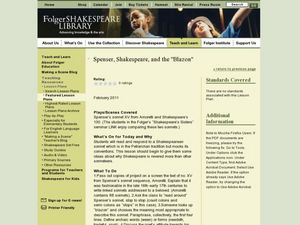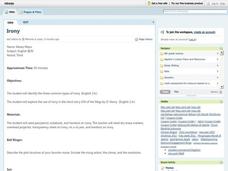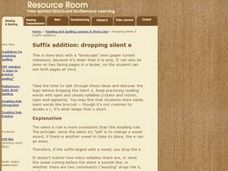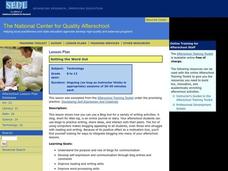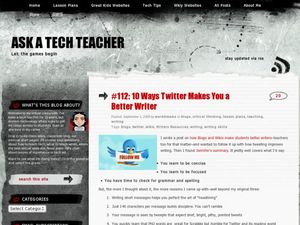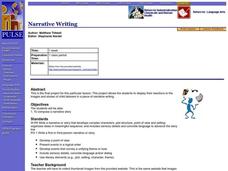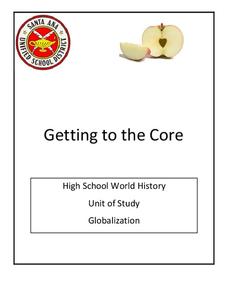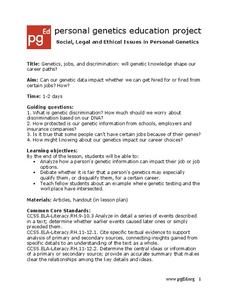Consortium for Ocean Science Exploration and Engagement (COSEE)
Plankton to Penguins: Antarctic Food Web
A well-written lesson plan, second in a series of four, gets high schoolers exploring how the Antarctic food web is impacted by climate change and the associated melting of polar ice sheets. It begins with a PowerPoint presentation about...
Curated OER
Spenser, Shakespeare, and the "Blazon": Lesson 4
Students discuss the meaning and tone of Shakespeare's Sonnet 130. In this sonnets instructional activity, students compare Spenser's sonnets to Shakespeare's. Students discuss specific words that add to the humor in Shakespeare's...
Southern Nevada Regional Professional Development Program
Review Games
Boggle, Jot Thoughts, Trading Cards, Commercial Breaks, Snowball Fight, Bingo, Draw it! Here’s a bunch of review games that would make a great addition to your curriculum library. The games can be easily adapted to address the Common...
Curated OER
Choosing Words Carefully
Use literacy tools to select precise vocabulary. High schoolers respond to discussion questions that require them to consider the denotation and connotation of words. They then read non-fiction passages and identify words in the passages...
Curated OER
History Personified
In 1856 Congressman Preston Brooks of South Carolina beat Senator Charles Sumner of Massachusetts over the head with a cane. This event, which highlighted the acrimonious debate over the expansion of slavery, is the focus of a paper...
Curated OER
Identify Text Features in Nonfiction
What does a non-fiction text look like? Examine the text features of non-fiction. Middle and high schoolers read non-fiction passages provided by their instructor and analyze the texts for word choice, details, and organization.
Curated OER
Literary Analysis of Theme
Remember reading "The Lottery" and "The Possibility of Evil" by Shirley Jackson? Learners can experience and analyze the tension, themes, and human experience found in these pieces through reading and class discussion. They use...
Curated OER
Texas Kid Writes Book About Presidents
Arranged into small groups, learners read a paragraph of the news story "Texas Kid Writes Book About Presidents." As one reads, others mark the text (underlining important information and writing notes in the margin of the story). After...
Curated OER
Narrative Nuts and Bolts
After viewing slides and reading about child labor, young authors compose an original narrative story. They practice note-taking skills and work to effectively engage a reader by incorporating plot, logical order, complex characters,...
Curated OER
Irony in Poetry and Prose (Fiction and Non-fiction Texts)
Middle and high schoolers examine the impact of irony in poetry and prose. In this figurative language lesson, they read instructor-selected literature and identify uses of irony. Then they discuss how irony enhances literature.
Curated OER
Irony
What are the three types of irony? High schoolers engage in a lesson about the use of irony while reading O.Henry's short story "Gift of the Magi." They'll discuss rising action, climax, and resolution in the text before highlighting the...
Curated OER
Suffix Addition: Dropping Silent "e"
High schoolers engage in a lesson that is concerned with the concept of using the silent "e" in certain words. They practice using the rules while reading them in a review. The application of the rule is given in the lesson and can be...
Curated OER
Getting the Word Out
Discuss and generate blogs in this technology lesson. Middle and high schoolers explore examples of blogs and create their own blogs. Use this lesson throughout the year to reinforce concepts from your language arts class (or any class)....
Curated OER
Analyzing Nonfiction Text Elements - Editorials
Examine the text features of non-fiction. Start the lesson by reading editorial samples provided by their instructor and analyze the texts for word choice, details, and organization. An editorial example and graphic organizer are...
Curated OER
How Do I Write an Article Critique?
Your middle and high schoolers have written tons of summaries, but can they give a strong critique of an article they've read? Identify the differences between summary writing and critiquing. Choose an interesting article and have...
Curated OER
Persuasive Elements
Investigate letters to the editor and their persuasive qualities. Break your class into reading groups and give each one a different article. As they read, they complete a graphic organizer to record their thoughts and opinions. There is...
Curated OER
The Learning Network: More Like Disney
A great source of high-interest reading for the language arts classroom! Meant to be used with an article also available on the New York Times website, this worksheet provides 10 comprehension questions about the reading as well as one...
Curated OER
Animation Pre-Production
Does your class love reading cartoons? Use their talents and interests to examine the process of writing a story they wish to tell through a cartoon. They develop the beginning, middle, and end of a story based on their original...
Curated OER
Ways Twitter Makes You a Better Writer
Practice being concise. Exercise your vocabulary. Improve your editing skills. The contention in this lesson plan is that by imposing a 140 character limit, the Twitter format actually helps improve writing skills. And of course class...
Curated OER
1900 America: Primary Sources and Epic Poetry
Using Walt Whitman's Song of Myself and Hart Crane's The Bridge as models, class groups first craft their own epic poems for 1900 and, using primary sources, create a multi-media presentation that captures the sights and sounds of life...
Curated OER
Narrative Writing
Imagine a day in the life of a child who has to work 12-14 hours a day, seven days a week. After viewing images and reading stories of child laborers, class members select an image and write a richly detailed narrative about a typical...
Curated OER
Essay Writing
Are your learners working towards their GED? First they study the GED essay rubric, and then they read a sample essay as a group. After studying the basic elements, they write an essay of their own. After peer editing, they revise their...
Santa Ana Unified School District
Getting to the Core: Globalization
How have advances in technology and communication changed our world? That is the questions that world history students contemplate as they examine a series of primary and secondary source materials
Personal Genetics Education Project
Genetics, Jobs and Your Rights
Your class will read an overview of the Genetic Information Nondiscrimination Act, passed in 2008 and address the question of whether or not genetic information should be used to influence our career paths. In jigsaw style, they then are...



